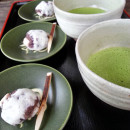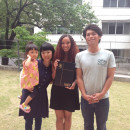My Definition of Home, Redefined Past Review
By Ashley B (Political Science and Government, Santa Clara University) - abroad from 08/31/2014 to 05/23/2015 with
IES Abroad: Nagoya Direct Enrollment - Nanzan University
I gained a lot of self confidence. Although I had a host family to help me, I had to do a lot of things on my own, including navigating a new city and mastering a new language. It was definitely worthwhile.
Review Photos


Personal Information
| How much international exposure did you have prior to this program? | 1 month - 6 months |
Review Your Program
|
* Overall educational experience
Academic rigor, intensity, resources, etc. |
The Japanese classes were intense and all in Japanese. At first that was difficult to get into, but after a while, I definitely saw my language ability greatly improve. The area studies classes were taught in English and by professors from different countries. They were all interesting courses, but the work load was almost non-existent (a lot of lecture, not much discussion/critical thinking) and I did have a couple professors that were really boring and rude. |
|
* Host Country Program Administration
On-site administration of your program |
IES was always there when we needed them. I had a host family, so most of this time I did not use IES, but whatever questions and concerns I did have, IES was there for me when I need them to be. At Nanzan, the CJS staff was also very helpful and always checked in to see how I was doing. |
|
* Housing:
How satisfied were you with your living arrangements? |
Deciding to live with a host family was the best decision I made while abroad. |
| * Food: |
Living with a host family, I had the opportunity to eat delicious home cooked meals and not have to worry about going to the grocery store and cooking for myself (with ingredients I knew little about). |
|
* Social & Cultural Integration:
How integrated did you feel with the local culture? |
Living with a host family definitely helped, but IES also took us to a lot of cultural concerts/events and trips that helped to ease myself into understanding Japanese culture. At Nanzan, there are many opportunities to meet and befriend Japanese students. I decided to join a dance circle, but other students decided to go to World Plaza (a place where you can go and speak to students in any language besides Japanese). |
|
* Health Care:
How well were health issues addressed during the program? |
I got sick many times while I was abroad, but one particular time when I first arrived prevented me from going to the hospital again. In Japan, you usually can not get medicine over the counter. Everyone goes to see a doctor when they are sick to get the medication they need to get better. I got really sick during my first week in Japan. My host mom took me to the hospital with my 2 year old host sister and we spent 5 hours waiting to get seen. When I finally went to see the doctor, who my host mom said could speak English, we ended up discovering that her English was not better than my Japanese level at the time (which meant there was no hope in me understanding any of the medical terms she used). My host mom had to translate between us the entire time. It was actually pretty horrible. Every other time I got sick during my stay, I usually would just take some ibuprofen and fight it out. I highly suggest bringing any medication from home with you or asking family members to send you something in a care package, because I don't think visiting a doctor is worth the hassle (unless you are very ill or it is an emergency). IES always requested that we tell them when we were sick and to let me know how we were doing. I never inquired with IES about any of my later sickneses because they were not as bad as my first one, but I am sure they would have came to my aid if I needed them to. There was also a clinic on Nanzan campus, but I never went. |
| * Safety: |
I felt very safe when I was in Japan. I am use to being constantly catcalled in the USA, but I was never catcalled unless I was out late and it was usually by other foreigners. |
| If you could do it all over again would you choose the same program? |
Yes
|
Finances
|
* Money: How easily were you able to live on a student's budget?
(1 = not very easy/$200+ on food & personal expenses/week, 2.5 = $100/week, 5 = very easily/minimal cost) |
Living with a host family meant that I had to commute to school every day. The cost of transportation was definitely a huge expense that I had to pay for when I first arrived. Every month afterwards, I tried and could easily live off of a $450 budget (for food, travel, shopping, anything outside of school that I participated in; I often had money extra money that rolled over to the next month). For those who decide to live in the Nanzan dorms, you wont have to pay as much for transportation monthly. Food is really inexpensive and I think students can easily live on a budget of $250 a month (if they decide to not do monthly travels and splurge on Japanese fashion hauls). |
| Not including program expenses, about how much money did you spend on food and other expenses each week? | $150 - $200 |
| Do you have any general money-saving tips for future study abroad participants? | Set a budget after your first couple of months. In order to get settled, you might end up spending a lot of money your first couple of months. After that time period, you will have an idea of how much you need to get by. Set a budget and stick to it. |
Language
| * Did your program have a foreign language component? | Yes |
|
How much did the program encourage you to use the language?
0 = No encouragement, 5 = frequent encouragement to use the language |
|
| How would you rate your language skills at the beginning of the program? | Beginner |
| How would you rate your language skills at the end of the program? | Intermediate |
| How many hours per day did you use the language? | 10+ |
| Do you have any tips/advice on the best ways to practice the language for future study abroad participants? | Speak the language as often as you can! I put intermediate for my "language skill rating at the end of the program" only because I can understand and write better than I can speak. Make Japanese friends and choose to live with a host family. |
Other Program Information
|
* Where did you live?
Select all that apply |
|
|
* Who did you live with?
Select all that apply |
|
|
* Who did you take classes with?
Select all that apply |
|
| About how many local friends did you make that you will likely keep in touch with? |
A Look Back
| * What did you like most about the program? |
|
| * What could be improved? |
|
| * What do you know now that you wish you knew before going on this program? | I wish I knew more Japanese. If I had studied Japanese more rigorously and with a language partner over the summer, I think I could have had more opportunities when I finally came to Japan. |
Reasons For Studying Abroad
| To help future students find programs attended by like-minded individuals, please choose the profile that most closely represents you. |
The Outright UrbaniteA social butterfly, you're happiest in bustling cities with hip people, and took advantage of all it had to offer. You enjoyed the nightlife, and had fun going out dancing, and socializing with friends. Fun-loving and dressed to the nines, you enjoyed discovering new restaurants, shops, cafes, and bars in your host country. |
Individual Course Reviews
| Course Name/Rating: |
Japanese Society |
| Course Department: | |
| Instructor: | Robert Crocker |
| Instruction Language: | English |
| Comments: | This course I took all year. The professor is from Australia and has nearly no accent, so he was really easy to understand. His class consisted of splitting the class up based on what article you chose to read for discussion that week. We would get into groups and discuss the contents of the articles. Each week was a different topic from what it means to be a man in Japan to how Japan as a nation reacts to natural disasters. A lot of what I was experiencing living with a host family and studying in Japan I could connect with the topics discussed in this class. Sometimes, there were also guest speakers and they brought with them other interesting topics (ex. A Jamaican woman gave a presentation on what it was like to be Black woman in Japan and how treatment has changed over time) which I think gave me a more well-rounded look at Japanese society (from inside and outside points of views). Highly recommend this course! |
| Credit Transfer Issues: |








